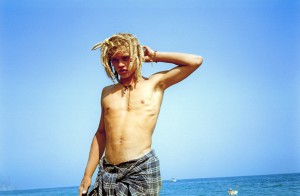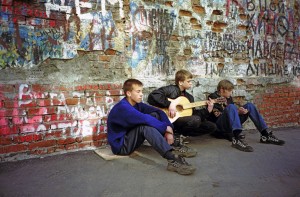In 2000, five years after his political exile to the US, Slava Mogutin returned to his Russian homeland to find a changed country – one filled with a wide array of subcultures that included homeless kids, street hustlers, military cadets, skinheads, punk rockers, and Crimean rastafarians, amongst others. He began to photograph these groups and compiled a collection of images that became known as the Lost Boys.
BEFORE EXILE
Long winters and short summers with fishing, hunting, and mushroom-picking defined Slava Mogutin’s childhood in Siberia. When, at age 7, their family moved away, Mogutin began defining his life path as an artist. With a home full of books and lack of TV, he began to read. And soon, write. As a third-generation writer, he launched into poetry and short fiction in his early teens, followed by journalism and criticism. And at age 14, he left his parents and moved to Moscow to go to high school. He was a lost boy, “a total punk [who] was regularly getting into trouble for [his] antisocial tendencies and style” in a conservative Soviet society. “Ultimately,” he concedes, “my poetry and art saved me from this self-destructive lifestyle” and at age 16, began publishing.
It was his writings that defined him and led to him leaving Russia in 1995. He was charged with “open and deliberate contempt for generally accepted moral norms,” “malicious hooliganism with exceptional cynicism and extreme insolence,” “inflaming social, national and religious division,” and “propaganda of brutal violence, psychic pathology and sexual perversions.” He was the first openly gay journalist in mainstream Russian media and was writing about gay issues in a country where homosexuality was a crime up until the early 90s. And when he and his American boyfriend, Robert Filippini sent out a handful of invitations to friends and press for their wedding at the Central Palace of Weddings in Moscow in 1994, they received a huge media response and were regarded as Russia’s gay pioneers. (The wedding, Mogutin describes, was as much a political demonstration as a performance.)
Soon after this event, the government went after Mogutin and setup two criminal cases against him. After being advised by his lawyer to leave the country or be jailed, he left for New York and was granted political asylum with the support of Amnesty International and the PEN American Center. Five days after leaving, an arrest warrant was issued for him.
Article in German can be viewed here for free. The English version is only available for iPhone or iPad for 99 cents here.

